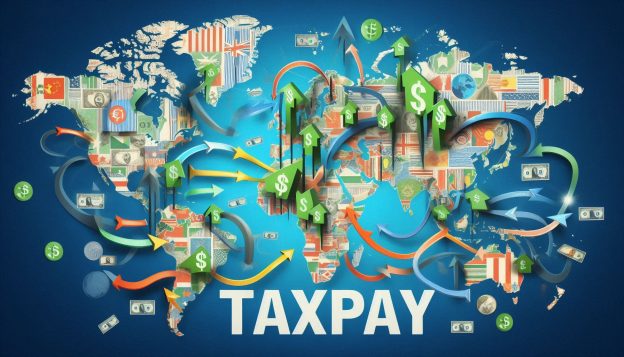In today’s digital age, businesses face evolving complexities when it comes to managing their tax obligations. As companies grow and expand their global footprint, managing tax compliance efficiently and settling tax liabilities in different jurisdictions can become a significant challenge. Fortunately, technology offers various solutions that simplify this process, allowing businesses to focus more on their growth while maintaining compliance. This article explores the different types of technologies and mechanisms organizations can leverage to settle tax liabilities, with a special focus on Desucla’s TaxPay solution.
1. Digital Payment Portals and E-Filing Systems
One of the most common ways businesses settle their tax liabilities is through government-provided digital payment portals. Many tax authorities now provide online platforms where businesses can file their returns and make payments directly. These portals offer a streamlined way to submit tax information, calculate liabilities, and process payments, reducing paperwork and eliminating the need for physical visits to tax offices.
– Benefits:
1. Direct integration with tax authorities.
2. Real-time confirmation of payments.
3. Automated calculations based on filings.
4. Enhanced transparency and record-keeping.
– Examples: Many countries have their own e-filing systems, such as the IRS e-file system in the U.S., HMRC’s online services in the UK, and the EU’s OSS (One-Stop Shop) for VAT.
While these platforms are widely adopted, they often vary in usability and support, particularly when dealing with cross-border transactions. For global businesses, additional tools may be needed to navigate different tax regimes and streamline the process (including the need to have a local individual to access the platform). Desucla TaxPay supports payments to these tax authorities.
2. Enterprise Resource Planning (ERP) Systems
ERP systems, like SAP, Oracle, and Microsoft Dynamics, offer comprehensive financial management modules that include tax calculation and payment capabilities. For large enterprises, integrating tax management into their existing ERP systems can help ensure that all financial data is consistent and compliant across multiple jurisdictions.
– Benefits:
1. Centralized financial management.
2. Automatic calculation of taxes based on location, product, and customer details.
3. Customizable reporting and analytics for better visibility into tax liabilities.
4. Integration with other business functions, such as accounting and procurement.
However, implementing ERP-based tax management can be costly and time-consuming, especially for smaller businesses or those without in-house expertise in configuring these systems. They often lack the integration to specialist tax payment knowledge required to orchestrate successful tax payments. Desucla TaxPay supports payment of liabilities processed by all ERP platforms.
3. Third-Party Tax Automation Software
For businesses seeking more flexibility and ease of integration, third-party tax automation software can be a game-changer. Solutions like Avalara, Vertex, and Thomson Reuters ONESOURCE provide tax calculation and reporting tools that integrate with existing accounting and e-commerce platforms. These tools are especially useful for handling sales tax, VAT, and other indirect taxes across multiple regions.
– Benefits:
– Automated tax calculation for e-commerce transactions.
– Real-time tax rate updates based on changing regulations.
– Streamlined compliance processes for various jurisdictions.
– API integrations with e-commerce and ERP platforms.
These platforms are particularly helpful for businesses operating in multiple regions with differing tax rates and rules. They automate complex tax calculations and ensure that businesses remain compliant without the need for deep in-house tax expertise. Whilst they support in the compliance activity they require a disparate payment mechanism to complete the process. Desucla TaxPay supports onward payment of Tax Liabilities identified by Third-Party Tax Automation Software.
4. Representation Services
For businesses that trade in a foreign market that requires representation, representation services play a crucial role in managing customs & tax liabilities. A fiscal representative acts on behalf of the business to ensure that taxes are paid correctly, often simplifying the process for companies that are new to a particular market.
– Benefits:
– Simplifies the process of registration and compliance.
– Reduces the risk of penalties due to incorrect filings.
– Offers expertise in local regulations and requirements.
Desucla specializes in this space, providing services that help businesses enter those markets requiring representation, without the complexities of direct VAT registration. This allows companies to meet their obligations efficiently and with minimal administrative burden settle their tax liabilities (utilising Desucla TaxPay to settle all tax liabilities seamlessly).
5. Desucla’s TaxPay Solution: A Comprehensive Approach
Desucla’s TaxPay solution is a unique offering that combines the ease of digital payment with the expertise of representation and tax payment, providing businesses with a seamless way to manage and settle their tax liabilities, regardless of the tax authority, tax type or complexity of assuring accurate reconciliation.
What is TaxPay? TaxPay is a streamlined digital payment solution that allows businesses to settle VAT, Digital Services Taxes, Customs Duties and in fact any non-individual taxes in a straightforward manner. Desucla’s solution is designed to handle the complexities of orchestrating international tax payments, making it ideal for companies that want to complete their compliance processes.
Key Features of Desucla’s TaxPay Solution:
– Integrated Payment Gateway: TaxPay allows businesses to pay their tax obligations through a secure, user-friendly digital portal, ensuring that all obligations are met without delay.
– Automated Compliance: The solution includes automated checks and calculations, ensuring that all payments align with the latest regulatory requirements.
– Representation: Desucla’s experience and network of local expertise is embedded into the platform to ensure payments are requested, received & allocated correctly every time.
– Cross-Border Expertise: Desucla’s team of tax payment experts coupled with our banking partners provides guidance on the nuances of international tax payments, helping businesses navigate compliance in settling tax liabilities internationally.
Why Choose Desucla’s TaxPay? TaxPay is particularly beneficial for businesses that are looking to expand their operations internationally but want to avoid the complexities of settling tax. By leveraging TaxPay, companies can focus on scaling their operations while knowing their tax liabilities are handled efficiently, accurately and matching their existing treasury processes.
Conclusion: Choosing the Right Solution for Your Business
Managing tax liabilities is a crucial aspect of running a business, and the right technology can make this process smoother and more efficient. While digital payment portals, ERP systems, and third-party software all offer their own advantages, a comprehensive solution like Desucla’s TaxPay can provide additional value, especially for businesses expanding into new regions, optimising internal processes or looking to reduce fines & penalties for non-compliance.
With Desucla’s TaxPay, you get the advantage of a secure payment system combined with expert guidance and support. This means less time spent ensuring payments are allocated correctly and more time focusing on what matters most—growing your business.
Ready to simplify your tax payments? Reach out to Desucla today to learn more about how our TaxPay solution can help you manage your tax liabilities with ease.



